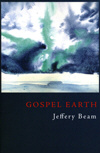Gospel Earth
Jeffery Beam’s celebration of the “small poem” in his latest collection, Gospel Earth, diverts his reader from ambient noise, trims the excess from the natural world. His poems stand out because they whisper, infusing Gospel Earth with stillness and secrecy. Beam creates a quiet book in form and tone, filling the page with white space that emphasizes the solitude and fragility of his images. His aim is to observe the “wide silences that do not ache to be filled,” and he invites the reader to collude with his minimalist vision. His poems emerge like
Jeffery Beam’s celebration of the “small poem” in his latest collection, Gospel Earth, diverts his reader from ambient noise, trims the excess from the natural world. His poems stand out because they whisper, infusing Gospel Earth with stillness and secrecy. Beam creates a quiet book in form and tone, filling the page with white space that emphasizes the solitude and fragility of his images. His aim is to observe the “wide silences that do not ache to be filled,” and he invites the reader to collude with his minimalist vision. His poems emerge like
Day’s eye
brighter
for clouds
breaking round it
(from “Treatise of the Daisy”).
They may not be loud, but they are effortlessly luminescent, so it is no coincidence that they so often concentrate on sunlight and nature, brilliantly describing the vicissitudes of daylight, from the brightest rays of midday to the subtle mist of dusk and twilight. But to reduce this collection to a treatise on nature is simplistic and misses the point. Instead, there is a darker, sadder lament tugging at the boundaries of these sparse lines – a sentiment that recognizes an intrinsic pain in detecting the unfiltered, unadulterated beauty of the world in all its rawness. Like Thoreau, Beam maintains a deep understanding of the life of “quiet desperation.” There is an extrasensory quality to his poems that enhances his mere word choice. In “To William Carlos Williams,” he praises that the older writer’s
poems sting with
innocence
gaiety &
passion.
This is a feature that Beam strives to bring to Gospel Earth, though he also wants his poems, like Williams’s, to “prick // sweetly,” rather than attest to observations. Observation requires a viewer, and this collection is devoid of egoism. The poems do not belong to Beam or a definite speaker; they are shared fragments of the world’s quietude. He infuses them with a kind of hushed, nonverbal eloquence that asks to be exhaled rather than read.





